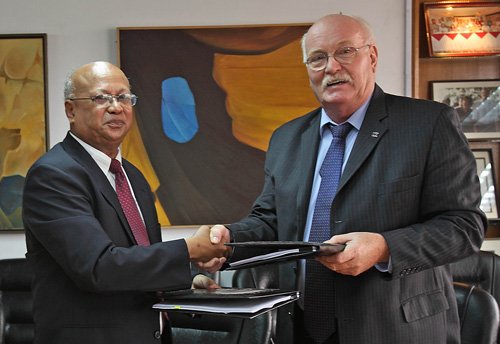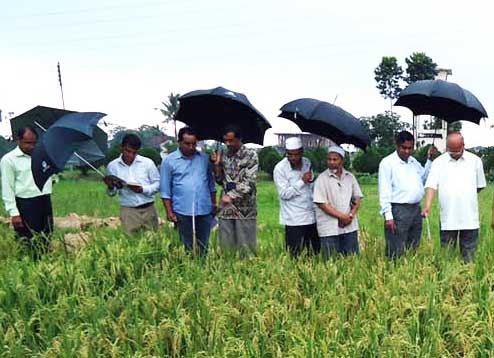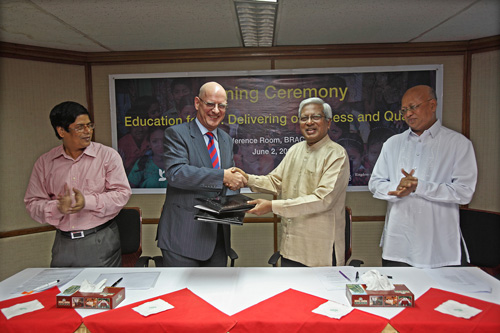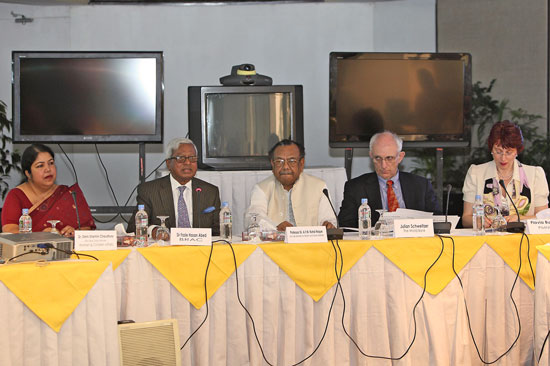
News (830)
Children with special needs participate in sports competition
07 July 2010, Dhaka. A total of 79 children with special needs (CSN) from BRAC schools in five districts participated and won 101 prizes in a divisional sports competition, organised by the National Association of Sports for Persons with Disabilities (NASPD).
BRAC’s CSN unit facilitated the students’ participation to promote their social right and boost their self-confidence.
About 24 organisations took part in the Divisional Sports Competition for People with Disabilities.
Children with special needs participate in sports competition
07 July 2010, Dhaka. A total of 79 children with special needs (CSN) from BRAC schools in five districts participated and won 101 prizes in a divisional sports competition, organised by the National Association of Sports for Persons with Disabilities (NASPD).
BRAC’s CSN unit facilitated the students’ participation to promote their social right and boost their self-confidence.
About 24 organisations took part in the Divisional Sports Competition for People with Disabilities.
Post -AILA Rehabilitation with EU support and BRAC expertise
30 June 2010, Dhaka. BRAC and the European Union (EU) signed a Euro 5 million (BDT 400 million) agreement today for "Restoring socio-economic stability and strengthening community resilience in areas affected by cyclone AILA". The EU support will help link the relief phase with the longer term reconstruction and development of the affected areas.

The signatories were Dr Stefan Frowein, Head of the EU Delegation to Bangladesh and Dr. Mahabub Hossain, Executive Director of BRAC.
The EU support, being made available under its Instrument for Stability, will provide much-needed interventions to promote socio-economic stability and to strengthen the economic and physical resilience and protection of communities against future natural disasters. Emergency support of Euro 9 million (BDT 720 million was provided earlier to AILA victims under ECHO. With this support EU continues to meet its responsibilities as a major donor during the post-AILA recovery period.
BRAC, which has been working continuously in the affected areas, will target its interventions to support poor small farmers and fishers, van pullers, small traders, homestead owners and landless day labourers over the next 18 months.
In comments made during the ceremony, Dr. Frowein said that "This additional support underlines the solidarity which the European Union has expressed with the government and the people of Bangladesh in the wake of this terrible natural disaster." and referred to the agreement with BRAC as "a competent partnership".
Dr. Hossain, in his speech, thanked EU for supporting the rehabilitation of AILA victims and noted with satisfaction the trust and confidence that BRAC had been able to earn from the EU through the effective implementation of a similar project for SIDR victims. BRAC, he said, was fully committed to serving the AILA affected people with the same efficiency and zeal.
The overall objective of the programme is to contribute to stability and rehabilitation in the coastal areas of south-western Bangladesh that were devastated and damaged by cyclone AILA.
BRAC Chairperson provides future directions for BRAC in Afghanistan

22 June 2010, Dhaka. BRAC Founder and Chairperson Sir Fazle Hasan Abed visited Afghanistan for a short trip (June 18th – June 21st) to get an up close view of BRAC’s progress there.
Sir Fazle was accompanied by other high officials of BRAC in the trip namely Muhammad A. (Rumee) Ali- Managing Director, BRAC Enterprise and Investments, Md. Aminul Alam- Executive Director, BRAC International Programmes and Md. Salauddin Imam-Director, BRAC Bank incorporate Afghanistan.
The Chairperson met with senior BRAC Afghanistan Staff and got briefed about the current activities of BRAC in Afghanistan. The Chairperson talked to each Programme Managers individually about the relevant programme activities and provided valuable suggestions for the improvement and future directions of the programmes.
Sir Fazle emphasised on reducing maternal mortality and on increasing the coverage of immunization in Afghanistan. He also spoke about establishing resident schools for girls and introducing the Targeting Ultra Poor Programme in Afghanistan. Sir Fazle further added that a BRAC Afghanistan Governing Body needs to be formed which would consist of highly distinguished professionals and elite social personalities who will bring their diverse skills and experience to the governance of BRAC Afghanistan.
The Chairperson also attended the Board meeting of BRAC Bank-Afghanistan.
Two receptions were also arranged in honour of the Chairperson being knighted. Among the guests Ministers and Deputy Ministers of the Afghan Government, embassy officials, civil society personalities, bank officials, Afghanistan Chamber & Commerce and donors attended the receptions.
BRAC contributes for fire victims
09 June 2010, Dhaka. BRAC has contributed BDT (Bangladeshi Taka) 30 lakh to the Prime Minister’s rehabilitation fund for the victims of the Neemtoli fire. BDT 10 lakh was donated by BRAC staff while the remaining 20 lakh were contributed from the organisation’s own funds.
The BRAC family joins the nation in praying for the departed souls, and commits to helping the families of the victims overcome this tragedy.
BRAC contributes for fire victims
09 June 2010, Dhaka. BRAC has contributed BDT (Bangladeshi Taka) 30 lakh to the Prime Minister’s rehabilitation fund for the victims of the Neemtoli fire. BDT 10 lakh was donated by BRAC staff while the remaining 20 lakh were contributed from the organisation’s own funds.
The BRAC family joins the nation in praying for the departed souls, and commits to helping the families of the victims overcome this tragedy.
BRAC experiments with fast-growing, high-yielding rice varieties
06 June 2010, Dhaka. BRAC’s Agricultural Research and Development Centre has been assessing the performance of early maturing Vietnamese and the NERICA (African) varieties of rice at its Gazipur farm.

Dr. Mahabub Hossain, BRAC Executive Director and BRAC Agriculture Researchers visit
90 days old plant in Gazipur
The BRAC experiment shows that the Vietnamese varieties (OM576 and AF996) perform better with regard to maturity and yield than the African varieties (see Table).
“We are excited with the superior performance of two Vietnamese varieties as potential short maturity variety for the aus season,” BRAC Executive Director Mahbub Hossain said in June. “They gave yields of 5.6 to 5.8 tons per hectare compared to 4.4 t/ha for BRRI Dhan 28 and matured in 95 days. Next year, we shall conduct this trial at different locations in Bangladesh,” he added.
Duration & Yield of 6 rice varieties
Variety Name Duration(Days) Yield(tons/ha)
OM576 95 5.8
AF996 95 5.57
OM1490 97 5.36
OM2718 97 5.11
OM4498 97 5.5
BRRI Dhan28 96 4.37
Table of the comparative yield of NERICA and Vietnamese varieties, and the Bangladesh check, BRRI Dhan 28, grown at BRAC Gazipur farm.
The fast-growing, high-yielding varieties could help Bangladesh achieve self-sufficiency in rice production. The NERICA varieties, which also resist pests and tolerate droughts and infertile soils better, can help improve food security in drier areas of the country.
Netherlands’ support of € 18.75 million for BRAC Education
02 June 2010, Dhaka. An agreement was signed with BRAC today under which the Netherlands will provide €18.75 million in support of "Education for All: Delivering on Access and Quality" activities. The duration of the agreement is till 31 December 2012 and the contribution will be pooled with the funds coming from DFID, CIDA, AusAID and OxfamNovib.

The signatories at the BRAC Centre agreement ceremony were H.E. Mr. Alphons Hennekens, Ambassador of the Kingdom of the Netherlands and Sir Fazle Hasan Abed, Chairperson of BRAC. Mr. Abu Alam Md. Shahid Khan, Secretary, Ministry of Primary and Mass Education (MoPME) was the guest speaker on the occasion.
In his speech, the Dutch Ambassador pointed out that BRAC`s education programme provides complementary services which are closely linked with the formal education system. He highlighted the results of BRAC`s Education Programme 2004-2009 and congratulated BRAC, its education staff and its partner NGOs for these achievements. The Ambassador commended Government`s approval of the new National Education Policy as a framework and foundation for a diverse but unified system of quality education for all Bangladeshi children.
Sir Fazle Hasan Abed, in his speech, reiterated the Ambassador`s message that BRAC`s activities in education are to support the Government to help achieve Bangladesh`s Education for All (EFA) goals within 2015. BRAC will focus on ensuring quality and reducing drop outs, essential for achieving EFA, and reaching underserved and hard-to-reach communities such as in the haors, chars, the Chittagong Hill Tracts and urban slums. He underscored the need for improving quality of secondary education for the development of Bangladesh`s human resources and the role of IT in education.
The Secretary-in-Charge of the Ministry of Primary and Mass Education, Mr. Abu Alam Md. Shahid Khan, emphasised the importance of strengthening public-private partnerships between Government and organisations like BRAC. He pointed out that Government aims at quality education for all children and appreciates the efforts and experiences of BRAC in education.
Developing a BRAC wide Child Rights Policy
11 May 2010, Dhaka. BRAC is on the process of developing a BRAC wide Child Rights Policy. Taking forward the process of developing this policy, a day long workshop was conducted today at BRAC Centre. The workshop was facilitated by Ms. Kate Eversteyn, Child Protection Officer, AusAID. The objectives of the workshop were to help BRAC:
(a) Define Child Abuse
(b) Examine Child protection policy and standards
(c) Identify the risks to children in various programmes
(d) Manage complaints of child abuse and
(e) Develop child protection policies and procedures.
BRAC- PMNCH analyse Millennium Development Goals of maternal health and child mortality
28 April 2010, Dhaka. BRAC and the Partnership for Maternal, Newborn and Child Health (PMNCH) have jointly organised a special meeting titled, “Mothers and Babies Speak: Moving Forward with Lessons on Maternal, Neonatal and Child Health (MNCH)” on April 28, 2010 at BRAC Centre, Dhaka from 10:00am-12:00pm. The PMCNH is a global alliance of over 300 members committed to achieve MDGs 4 and 5.

(From Left) State minister of Women and Children Affairs Dr. Shirin Sharmin Chowdhury, Founder and Chairperson of BRAC Sir Fazle Hasan Abed, Minister of Health and Family Welfare Prof. Dr. A.F.M Ruhal Haque, Acting Vice President of Human Development Network of the World Bank Dr. Julian Schweitzer
This meeting was specifically convened to review the key developments in Millennium Development Goals (MDGs) 4 and 5 in Bangladesh, discuss the role and contribution of public-private partnership and take lessons of Bangladesh to the upcoming MDG Summit in New York in September.
Sir Fazle Hasan Abed, founder and chairperson of BRAC, welcomed the international and national participants drawing attention to commitments in terms of financial, physical and technical investments to MDGs 4 and 5, particularly, maternal health. Sir Fazle inaugurated the meeting with a video message from Sarah Brown, the First Lady of United Kingdom and Co-Chair, Maternal and Child Health Leadership Group. In the video message, Mrs. Sarah Brown accentuated the role of global leaders to maternal mortality campaign. She continued to express her gratitude to Prime Minister Sheikh Hasina for her role in Bangladesh for the improvement of maternal, newborn and child health and also highlighted BRAC’s contribution, particularly, Sir Fazle Hasan Abed to this arena in Bangladesh and beyond.
Prof Dr. Shahidullah, Pro-Vice Chancellor, Bangabandhu Sheikh Mujib Medical University (BSSMU) reviewed the state of maternal, neonatal and child health in Bangladesh emphasising successes, challenges and gaps in health sectors. He said that Bangladesh is on track for MDG 4, but not for MDG 5 and hence, it is crucial to address challenges and gaps in order to improve the situation. Dr. Kaosar Afsana, Associate Director, BRAC Health Programme discussed about the critical role of public-private partnership in achieving MDGs 4 and 5. In this context, she stated that BRAC has created significant improvement in maternal and neonatal health in urban slums and rural districts of Bangladesh. Mr. Anir Chowdhury, Policy Advisor and Head of Access to Information Programme of Prime Minister’s Office, drew attention to the role of ICT and e-health in digitalizing Bangladesh and how private sector collaborations are contributing to achieving health MDGs.
Prof. Dr. A.F.M Ruhal Haque, Hon’ble Minister, Ministry of Health and Family Welfare participated in the event as the Chief Guest and stressed that the upcoming G8 and MDG review would mobilise financial investments in maternal health and child health.
Dr. Julian Schweitzer, Chair, the PMNCH and Acting Vice President, Human Development Network of the World Bank, and Dr Flavia Bustreo, Director, the PMNCH attended the meeting as the Special Guests. Distinguished Members of the Parliamentarians, Board Members of the PMNCH, Director General Health Services and UN agencies and development partners, civil society members, development practitioners and researchers were present in this special event.
This meeting was convened as the inaugural event for the Board meeting of the PMNCH to be hosted by BRAC during April 28 – 30 in Dhaka, Bangladesh.
Join the world’s biggest family




